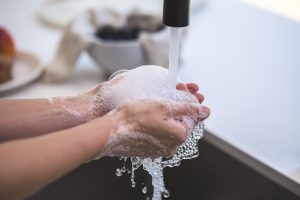A lot of times when we are unable to wash our hands, we will use hand sanitizers as our cleaners. Hand sanitizers have become popular over the years, it is even plastered on almost every wall in hospitals. There has been a lot of debate over the years whether this method is good for you, or actually harms you. Some studies suggest that using them may not kill all the bacterial growth, and actually promote the growth of super germs. When it comes down to it, using a hand sanitizer depends on the situation at hand. There are times when hand sanitizers are convenient and easy for use, but washing your hands is always best.

Is It Useful?
The Centers for Disease Control and Prevention, CDC, recommends using hand sanitizers when there is no water and soap available. It is best to go for hand sanitizer that contains at least 60% alcohol in it. Alcohol-free sanitizers are appealing because it will not dry out your hands as much, but they have been shown to be less effective.
When Not To Use It
Washing your hands is the best way to get rid of most bacteria and microbes in any situation. When your hands are visibly dirty, or contain certain fluids, then hand sanitizers simply won’t do the trick. Situations where water and soap is needed are:
- When you have blood or body fluids on your hands.
- When you use the bathroom.
- When you have chemicals on your hands.
- When you have been exposed to a person who is sick.
- When you are preparing or handling food.

Washing your hands is better than hand sanitizer in most situations.
The Proper Way to Use Hand Sanitizer
The same concept goes for handling hand sanitizers as it does when washing your hands. A quick pump or quick wash will not be as effective. In order to properly apply sanitizer, you must apply a dime size amount to the palm of your hand. Then rub your hands together, covering the top and bottom of your hands. Include in between your fingers. Make sure to get the tips of your fingers that touch most things, and even the fingernails. Rub for 30 seconds, or until your hands completely absorb the sanitizer and is dry.
Hand sanitizers do not replace the efficiency of washing with water and soap. But, it is great for times when you may be exposed to people who are sick and need to kill some germs. It is proven to reduce the number of microbes on your hands, but not as much as washing your hands with soap. Hand sanitizers can add that needed protection from spreading germs when you are in a pinch. Make sure to apply it correctly, and know that washing your hands is your best protection.
